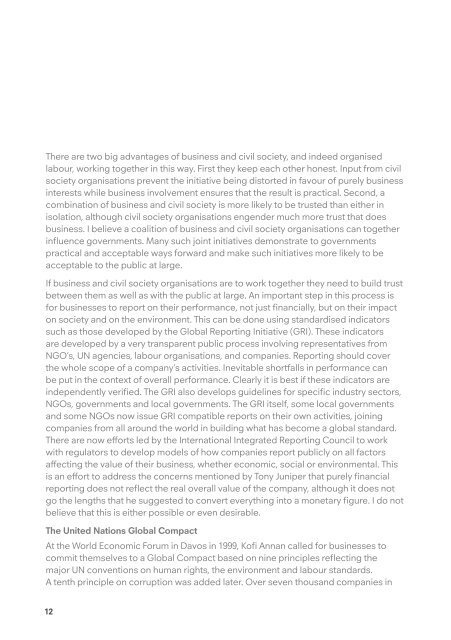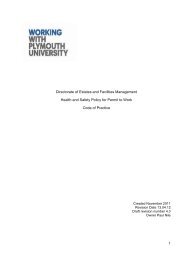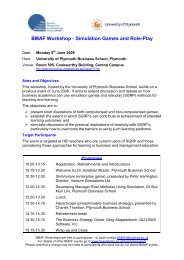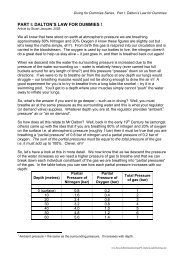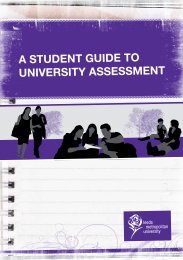Download a .pdf of Sir Mark Moody Stuart's full Beyond ... - Plymouth
Download a .pdf of Sir Mark Moody Stuart's full Beyond ... - Plymouth
Download a .pdf of Sir Mark Moody Stuart's full Beyond ... - Plymouth
Create successful ePaper yourself
Turn your PDF publications into a flip-book with our unique Google optimized e-Paper software.
There are two big advantages <strong>of</strong> business and civil society, and indeed organisedlabour, working together in this way. First they keep each other honest. Input from civilsociety organisations prevent the initiative being distorted in favour <strong>of</strong> purely businessinterests while business involvement ensures that the result is practical. Second, acombination <strong>of</strong> business and civil society is more likely to be trusted than either inisolation, although civil society organisations engender much more trust that doesbusiness. I believe a coalition <strong>of</strong> business and civil society organisations can togetherinfluence governments. Many such joint initiatives demonstrate to governmentspractical and acceptable ways forward and make such initiatives more likely to beacceptable to the public at large.If business and civil society organisations are to work together they need to build trustbetween them as well as with the public at large. An important step in this process isfor businesses to report on their performance, not just financially, but on their impacton society and on the environment. This can be done using standardised indicatorssuch as those developed by the Global Reporting Initiative (GRI). These indicatorsare developed by a very transparent public process involving representatives fromNGO’s, UN agencies, labour organisations, and companies. Reporting should coverthe whole scope <strong>of</strong> a company’s activities. Inevitable shortfalls in performance canbe put in the context <strong>of</strong> overall performance. Clearly it is best if these indicators areindependently verified. The GRI also develops guidelines for specific industry sectors,NGOs, governments and local governments. The GRI itself, some local governmentsand some NGOs now issue GRI compatible reports on their own activities, joiningcompanies from all around the world in building what has become a global standard.There are now efforts led by the International Integrated Reporting Council to workwith regulators to develop models <strong>of</strong> how companies report publicly on all factorsaffecting the value <strong>of</strong> their business, whether economic, social or environmental. Thisis an effort to address the concerns mentioned by Tony Juniper that purely financialreporting does not reflect the real overall value <strong>of</strong> the company, although it does notgo the lengths that he suggested to convert everything into a monetary figure. I do notbelieve that this is either possible or even desirable.The United Nations Global CompactAt the World Economic Forum in Davos in 1999, K<strong>of</strong>i Annan called for businesses tocommit themselves to a Global Compact based on nine principles reflecting themajor UN conventions on human rights, the environment and labour standards.A tenth principle on corruption was added later. Over seven thousand companies inone hundred and forty-five countries have committed themselves publicly to theseprinciples, making the UN Global compact the world’s largest voluntary corporatecitizenship and sustainability movement. Part <strong>of</strong> the genius <strong>of</strong> K<strong>of</strong>i Annan was that heinvolved civil society and labour organisations in the process. The Compact provides aforum where businesses, civil society and labour organisations can develop practicalapproaches to the delivery <strong>of</strong> the high level principles.Initially, as a voluntary organisation, the Compact was criticised by some as being justtalk, or “blue wash”. But when companies sign up they commit, in a letter supportedby the board <strong>of</strong> the company, to report publicly on what they are doing to try toembed each <strong>of</strong> the principles (covering human rights, the environment, workingconditions and anti-corruption) into their day to day operations. These so called“Communications on Progress”, <strong>of</strong>ten also in line with the GRI reporting principles,are available for public scrutiny. Whether or not they are independently verified,companies can be held to account by civil society organisations based on thesereports. If a company fails to report within a certain period <strong>of</strong> time, it is delisted fromthe Global Compact. Many companies have been delisted. This has done much for thecredibility <strong>of</strong> the movement.While the Global Compact remains voluntary, there are many encouragements apartfrom the interest <strong>of</strong> consumers and civil society organisations for a company to applyitself seriously to supporting all the principles <strong>of</strong> the Compact. A spin-<strong>of</strong>f from theCompact is a group <strong>of</strong> over a thousand long term investors who have committedthemselves to an initiative called the Principles for Responsible Investment (PRI).This group, which between them have over thirty trillion dollars worth <strong>of</strong> fundsunder management, commit themselves to taking into account the principles <strong>of</strong>the Global Compact and reporting in line with the GRI in making their investmentdecisions. At the same time many <strong>of</strong> the other voluntary initiatives on environmentaland social sustainability developed by civil society organisations with business havebeen incorporated over time into the Performance Standards <strong>of</strong> the World Bank’sInternational Finance Corporation (IFC). Compliance with these standards is not justnecessary for companies working with the IFC or using IFC or World Bank loans, butis also a condition for receiving project finance for major projects financed by any <strong>of</strong>the more than seventy banks who have signed the Equator Principles, another initiativedeveloped by banks and civil society organisations working together.In these various ways, the activities and investments <strong>of</strong> companies in countriesall around the world are being gradually brought into compliance with standards12 13


